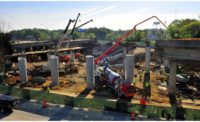One firm that's been drawn to North Carolina recently is PCL Civil Constructors, which last year landed its first-ever contract with NCDOT, a $215-million design-build venture with HDR Engineering for replacing the aging Bonner Bridge in the Outer Banks.
"What impresses me most is their willingness to collaborate with contractors, designers and all other stakeholders," says Jim Schneiderman, PCL's area manager in Raleigh. "They let us know how certain things need to be done, but they are also receptive to new ideas and innovative solutions when appropriate."
Tolls, Other Innovative Financing
North Carolina is already leaning heavily on tolls, as evidenced by its ongoing $1-billion Triangle Expressway projects in Wake and Durham counties. The initial 3.4-mile section, termed the Triangle Parkway and estimated at $183.8 million, opened in December. The 12.6-mile Western Wake Freeway section, estimated at $783.7 million, should open to traffic later this year.
But FHWA's February inclusion of NCDOT into its Interstate System Reconstruction and Rehabilitation pilot program takes the state to a higher level. The designation was partly a result of planning that began in 2009, when the agency hired Baker Engineering and PBS&J (now Atkins) to conduct a study assessing various options related to improving I-95.
The study, published in January 2012, evaluated the feasibility of widening I-95 to either six or eight lanes as well as reconstructing or rehabilitating existing roads and bridges. The study estimated that the project, built out over 20 years, would cost about $4.4 billion. Undetermined is whether it would be a state-run system, concessioned or a mix of the two approaches.
Conti—formerly assistant secretary of transportation policy in the U.S. Dept. of Transportation—isn't thrilled about tolling, but he sees it as a viable funding option.
"I hate to call myself an advocate for tolling, but I am an advocate for finding resources to build the infrastructure we need to support our economy," he says. "We are building new roads in North Carolina that will be tolled because we don't have revenues coming in from the gas tax to support building them. Tolling is a fact of life for new construction."
Conti adds that the state will continue to make "aggressive" use of other funding vehicles, such as Grant Anticipation Revenue Vehicle (GARVEE) bonds and Transportation Infrastructure Finance and Innovation Act (TIFIA) loan support. "We're trying to make sure that we can keep things moving," he says.
Riding the Rail
North Carolina was one of the bigger winners in the recent high-speed rail sweepstakes, landing more than $600 million for the upgrading of track between Charlotte and Raleigh to help boost speeds.
Conti, who currently serves as the chairman of the American Association of State Highway and Transportation Officials' standing committee on rail transportation, is a definite proponent. The number of annual rail commuters topped 1 million in 2011, a result of expanded service.









Post a comment to this article
Report Abusive Comment